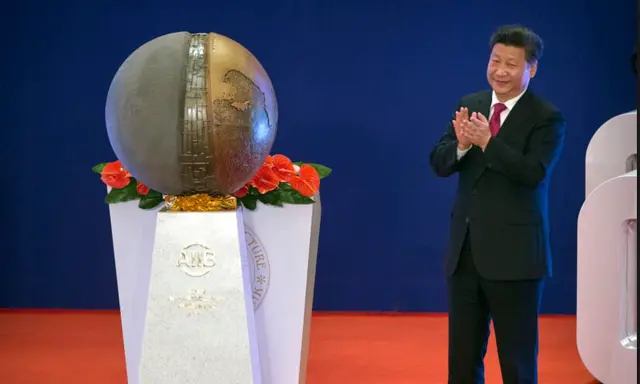Cubans on Monday raised Cuba's national flag over the country's newly opened embassy in Washington D.C., the U.S. capital, as diplomatic relations between two nations were restored after more than half a century.
Cuban Foreign Minister Bruno Rodriguez attended the embassy reopening ceremony in Washington D.C. Crowds of people cheered as the Cuban national anthem played and Rodriguez hoisted the Cuban flag for the first time since 1961, when diplomatic relations between the two countries were severed.
Earlier on Monday, the Cuban flag was also hoisted in the lobby of the U.S. State Department next to those of other countries that have established diplomatic relations with the United States. Full diplomatic ties between the two countries were restored at the stroke of midnight, as an agreement to resume normal relations took effect on July 20.
During the embassy reopening ceremony, dozens of protestors gathered outside the embassy with signs and banners, calling for, among others, lifting U.S. embargo against Cuba.
"It's the beginning of a brand new marriage, a whole new relationship," film producer Skipper Bailey told Xinhua. "The United States has to drop the blockade, has to begin cultural- economic ties with Cuba. That's going to be very very important."
Elizabeth Lowengard, who is with the group of ANSWER Coalition, said: "The blockade still exists, which means it's very difficult for Cuba to trade ... So it's far from over. Cuba really needs our assistance to help the pressure on the U.S. government and the blockade."
The embargo cannot be lifted without the backing of U.S. Congress. Some Republican leaders have expressed opposition to a thaw in U.S.-Cuba relations, accusing the Obama administration of appeasing the Cuban government.
"We have a big fight on the Hill," Bailey said, referring to the U.S. Congress. "But we hope the American public steps forward. "
At a reception later inside the embassy building, Rodriguez also urged the U.S. to lift the blockade, return "occupied territory in Guantanamo," and show respect for the sovereignty of Cuba.
The U.S. Embassy in Havana, the Cuban capital, was also officially reopened Monday. U.S. Secretary of State John Kerry will travel to Havana on Aug. 14 to attend a flag-raising ceremony at the U.S. Embassy there.
"Beginning today, our diplomats in Havana will have the ability to engage more broadly across the island of Cuba, with the Cuban government, civil society and ordinary Cubans," White House spokesman Josh Earnest said in a statement.
Later on Monday, Rodriguez paid the first visit to the U.S. Department of State by a Cuban foreign minister since 1958 and held talks with Kerry.
At a joint press conference after the talks, Kerry welcomed the resumption of normal diplomatic ties between U.S. and Cuba and the re-opening of their embassies after a rupture that has last 54 years, calling Monday "a historic day, a day for removing barriers. "
"It does reflect the reality that the Cold War ended long ago and that the interests of both countries are better served by engagement than by estrangement," Kerry said, adding that, however, "this milestone does not signify an end to differences that still separate our governments."
For his part, Rodriguez emphasized some of the demands made by Havana, saying that "totally lifting the blockade, the return of the illegally occupied territory of Guantanamo as well as the full respect for Cuban sovereignty and the compensation to our people for human and economic damages" are essential to move towards the normalization of relations.
Noting that President Barack Obama has called on Congress to lift the embargo, Kerry said the U.S. hopes it would come "at the appropriate time" and that a great deal more foundation can be built for the relationship.
With respect to the Guantanamo issue, Kerry said there is "no discussion and no intention" on the U.S. part at this moment to " alter the existing lease treaty or other arrangements" concerning the U.S. naval base in Cuba.
"But we understand that Cuba has strong feelings about it," Kerry added.
On July 1, Obama announced that Washington and Havana had agreed to formally re-establish diplomatic relations and reopen embassies, in what he called "a historic step in our efforts to normalize relations with the Cuban government and people."
Obama and Cuban leader Castro announced in December the decision to restore diplomatic relations following more than five decades of enmity. Washington and Havana have held four rounds of talks in past months in a bid to restore diplomatic relations.
Obama met with Castro in Panama on the sidelines of a regional summit in April, the most significant interaction between U.S. and Cuban leaders in more than five decades.
In late May, the U.S. officially removed Cuba from its list of state sponsors of terrorism, clearing a major obstacle to reestablishing diplomatic ties between the former Cold War rivals. Enditem
 简体中文
简体中文

